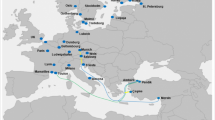Abstract
To improve the efficiency of ship traffic in frequently traded sea areas and respond to the national “dual-carbon” strategy, a multi-objective ship route induction model is proposed. Considering the energy-saving and environmental issues of ships, this study aims to improve the transportation efficiency of ships by providing a ship route induction method. Ship data from a certain bay during a defined period are collected, and an improved backpropagation neural network algorithm is used to forecast ship traffic. On the basis of the forecasted data and ship route induction objectives, dynamic programming of ship routes is performed. Experimental results show that the routes planned using this induction method reduce the combined cost by 17.55% compared with statically induced routes. This method has promising engineering applications in improving ship navigation efficiency, promoting energy conservation, and reducing emissions.
Similar content being viewed by others
References
Ahmed T, Sankar S, Sandhya M (2021) Multi-objective optimal medical data informatics standardization and processing technique for telemedicine via machine learning approach. Journal of Ambient Intelligence and Humanized Computing 12(5): 5349–5358. DOI: https://doi.org/10.1007/s12652-020-02016-9
Cao YH (2010) Research on ship trajectory planning method based on particle swarm optimization algorithm. Master thesis, Fudan University, Shanghai, 37–45.
Chen SY, Shao ZP, Fang XL, Shao CF (2001) Research on the simulation model of traffic flow in harbor waterways. Journal of Dalian Maritime University 27(1): 34–38. DOI: https://doi.org/10.16411/j.cnki.issn1006-7736.2001.01.008
De A, Choudhary A, Tiwari MK (2019) Multiobjective approach for sustainable ship routing and scheduling with draft restrictions. IEEE Transactions on Engineering Management 66(1): 35–51. DOI: https://doi.org/10.1109/TEM.2017.2766443
De A, Wang JW, Tiwari MK (2020) Hybridizing basic variable neighborhood search with particle swarm optimization for solving sustainable ship routing and bunker management problem. IEEE Transactions on Intelligent Transportation Systems 21(3): 986–997. DOI: https://doi.org/10.1109/TITS.2019.2900490
De AR, Wang JW, Tiwari MK (2021) Fuel bunker management strategies within sustainable container ship** operation considering disruption and recovery policies. IEEE Transactions on Engineering Management 68(4): 1089–1111. DOI: https://doi.org/10.1109/TEM.2019.2923342
Dong HC (2020) Research on traffic state discrimination and short-time traffic flow prediction method based on deep learning. Master thesis, Bei**g Jiaotong University, Bei**g, 21–28.
Du S, Liu YH, Chen X (2018) Open water sailing vessel route planning based on genetic algorithm. Journal of Shanghai Maritime University 39(2): 1–6. DOI: https://doi.org/10.13340/j.jsmu.2018.02.001.
Huang DM, Yang J, He SQ (2018) Research on route planning of improved A* algorithm based on weights. Marine Information 33(2): 16–22. DOI: https://doi.org/10.19661/j.cnki.mi.2018.02.004
James M, Alice L, Alejandro GS (2023) Mitigating stochastic uncertainty from weather routing for ships with wind propulsion Ocean Engineering 281(1): 1–15. https://doi.org/10.1016/j.oceaneng.2023.114674
Li LZ, Ji B, Yu SS (2022) Branch-and-price algorithm for the tramp ship routing and scheduling problem considering ship speed and payload. Journal of Marine Science and Engineering 10(12): 1–16. https://doi.org/10.3390/jmse10121811
Li M, **-concept and composition of ship navigation guidance system. World Maritime Transport 42(7): 29–32. DOI: https://doi.org/10.16176/j.cnki.21-1284.2019.07.007
Liu RW, Chen J, Liu Z (2017) Vessel traffic flow separation-prediction using low-rank and sparse decomposition. IEEE 20th International Conference on Intelligent Transportation Systems (ITSC), Yokohama, 1–6. DOI: https://doi.org/10.1109/ITSC.2017.8317741
Liu Y, **e XL, He A (2019) Ship route planning in continuous construction waters. China Navigation 42(3): 51–54
Liu ZY, Zhou CH, Zhao JN (2021) Modelling and simulation of channel passing capacity based on metacellular automata. Journal of System Simulation 33(10): 2478–2487. DOI: https://doi.org/10.16182/j.issn1004731x.joss.20-0587
Lv C, Cui M, Wu G (2022) Ship route planning method for polar regions based on Dijkstra’s algorithm. Ship Engineering 44(6): 10–19. https://kns.cnki.net/kcms2
Ma YH, Qiang YR, Yang M (2020) A time series forecasting method based on empirical modal decomposition. Journal of Northwest Normal University (Natural Science Edition) 56(1): 27–34. DOI: https://doi.org/10.16783/j.cnki.nwnuz.2020.01.004
Neumann T (2015) Good choice of transit vessel route using Dempster-Shafer theory. International Siberian Conference on Control and Communications (SIBCON), Omsk, 1–4. DOI: https://doi.org/10.1109/SIBCON.2015.7146964
Shao CF, Fang XL (2002) Fluid modelling of ship traffic flow. Journal of Dalian Maritime University 28(1): 52–55. DOI: https://doi.org/10.16411/j.cnki.issn1006-7736.2002.01.014
Tsou MC, Kao SL, Su CM (2010) Decision support from genetic algorithms for ship collision avoidance route planning and alerts. Journal of Navigation 63(1): 167. https://doi.org/10.1017/S037346330999021X
UNCTAD secretariat (2022) Trade geography and supply chain reconfiguration: Implications for trade, global value chains and maritime transport. Geneva, Report No. TD/B/C.I/54
Umit G (2023) Estimating bulk carriers’ main engine power andemission. Brodogradnja 74(1): 85–98. https://doi.org/10.21278/brod74105
Yang X, Li K, Chen WB (2013) Research on modelling and simulation of inland ship traffic flow. China Navigation 36(3): 80–85. https://kns.cnki.net/kcms2
Zhao HC (2017) Design of dynamic route planning method based on real weather. Master thesis, Harbin Engineering University, Harbin, 12–19.
Zhu J (2010) Traffic time impedance model based on ship flow. Journal of Wuhan University of Technology (Transportation Science and Engineering Edition) 34(3): 591–594. https://kns.cnki.net/kcms2
Funding
Funding Supported by the National Key R&D Program of China project (2017YFC0805309) and the National Natural Science Foundation of China (60602020).
Author information
Authors and Affiliations
Corresponding author
Ethics declarations
Competing interest The authors have no competing interests to declare that are relevant to the content of this article.
Additional information
Article Highlights
• Taking into consideration the integrative nature of ship induction results, establish a multi-objective ship route induction model.
• In order to adapt to the development requirements of the ship** industry under new circumstances, energy saving and environmental protection factors are considered in the ship route induction process.
• In this study, the concept of joint road resistance function is proposed, providing route impedance data support for ship induction.
Rights and permissions
About this article
Cite this article
Zhang, H., Dong, J. & Kong, S. Multi-Objective Dynamic Induction Research of Ship Routes in the Context of Low Carbon Ship**. J. Marine. Sci. Appl. (2024). https://doi.org/10.1007/s11804-024-00458-7
Received:
Accepted:
Published:
DOI: https://doi.org/10.1007/s11804-024-00458-7




